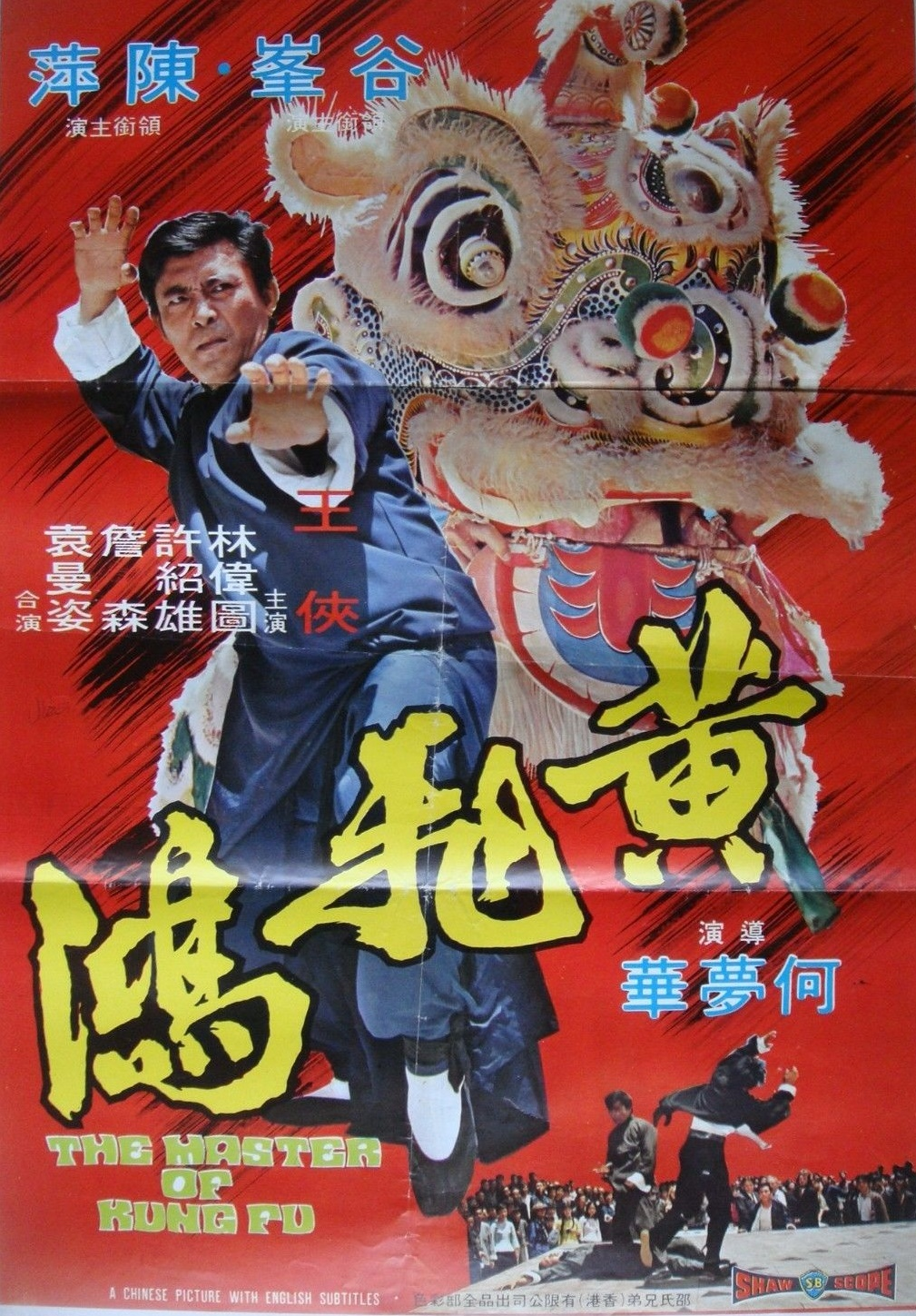Master of Kung Fu (1973)
Aka: Death
Kick; Shaolin Death Kicks; Wong Fei-Hung Bravely Broke through the Flames
Chinese Title: 黃飛鴻
Translation: Wong Fei-Hung
Starring: Ku Feng, Chen Ping, Lam Wai-Tu, Hui Siu-Hung,
Wang Hsieh, Wong Hon, Chan Shen, Law Hon
Director: Ho Meng Hua
Action Director: Yuen Woo-Ping, Yuen Cheung-Yan
An appreciation for this otherwise routine kung fu movie requires a bit of understanding about both the film’s subject matter and its place in kung fu cinema history. The story revolves around Chinese folk hero Wong Fei-Hung, a Cantonese martial artist and herbalist who operated out of the city of Foshan. He trained in the Hung Gar style of kung fu and was both an expert pole fighter and an accomplished lion dancer. He was also known for being the martial arts instructor for the local militia, although in his younger years, he apparently participated in a failed coup against the Qing Dynasty.
Wong Fei-Hung became the subject of many a film, most notably a series of films starring actor Kwan Tak-Hing. The first in said series was The Story of Wong Fei-Hung (1949) and the second two decades saw about 75 films produced. This cycle of Wong Fei-Hung movies ended in 1970 with Wong Fei-Hung: Bravely Crushing the Fire Formation. Kwan Tak-Hing entered a partial retirement after that and contemporary kung fu films like The Chinese Boxer would render Kwan’s style of film old hat. Nonetheless, Kwan Tak-Hing would occasionally reprise his role, such as in the 1974 film The Skyhawk and later kung fu comedies like The Magnificent Butcher (1979) and Dreadnaught (1981).
The Master of Kung Fu is probably the first Wong Fei-Hung film to not star Kwan Tak-Hing. This time, the role is unlikely filled by perennial Shaw villain Ku Feng (The Flying Guillotine and The Kung Fu Instructor). In this film, Wong Fei-Hung is something of a pacifist, still reeling over an incident ten years before in which he accidentally killed his martial brother (a cameo by Tino Wong Cheung) with his famous No-Shadow Kick. This particular technique did exist and is depicted here as a powerful front kick. Other films like The Magnificent Kick (1980) and Operation Scorpio (1992) feature similar portrayals. However, once Jet Li started playing Wong Fei-Hung in the 1990s in the popular Once Upon a Time in China series, the move was shown as a wire-assisted stunt allowing the person to kick the opponent several times without letting his feet touch the ground.
The plot involves around a Caucasian opium dealer and jade collector named Gordon who needs a new security chief. Staging a tournament for the position, the two main candidates are Master Mai (Chan Shen, of Heroes of Sung and Five Fingers of Death), Wong's cousin and rival, and Li (Wang Hsieh, of Lady with a Sword and Call to Arms), a former pirate that tangoed with Wong years before during his Navy days. Li critically wounds Mai during their duel, and Wong discovers that Li was cheating via iron elbow guards hidden in his sleeves.
Fearing that Wong Fei-Hung will soon become a thorn in his side, Li and his business associate, Fox (Wong Hon, who had small roles in The Lizard and The Bastard), frame Wong Fei-Hung for murder, kidnap his top students, and engineer the massacre of Wong’s other students. These two scoundrels do all sorts of other bad things before Wong finally snaps and deals out kung fu justice. Helping him through all of this is a comely Peking Opera star (Shaw Brothers sex symbol Chen Ping, who also showed in Tiger Boxer and Killer Clans), who’s also the object of the aforementioned Gordon’s affections.
The film is surprisingly dark for a Wong Fei-Hung movie, probably beat only by the slasher approach to Dreadnaught, which went so far as to kill Wong’s famous student Leung Foon. While his top students aren’t killed, they are viciously tortured. When the town’s respected kung fu masters try to step in on Wong’s behalf, Li and Fox use treachery to get rid of them as well. Wong Fei-Hung goes through the emotional ringer in this film, and Ku Feng gives our hero a more introspective take on the hero, as opposed to Jet Li’s portrayal of Wong Fei-Hung as an infallible moral force and Jackie Chan’s arrogant young scamp in the Drunken Master movies. Ku Feng’s Wong Fei-Hung is imperfect and knows he is, but is also completely horrified and overwhelmed by the events unfolding around him, especially when he’s simply doing his best to do the right thing.
When Wong Fei-Hung eventually turns the
tables against his tormentors, he does so under the direction of Yuen Woo-Ping
and Yuen Cheung-Yan, both of whom we discussed in The Bloody Fists. It’s surprising and impressive to see both men
presenting us with the intricate technique-based choreography so early; this
was a year before Lau Kar-Leung and Chang Cheh started their Shaolin Cycle,
which brought traditional Southern Chinese martial arts to the forefront. There
is still some basher-esque moves, but the choreography is more complex than
you'd get from a dozen cheap chopsockeys churned out in the same period.
There's some three-section staff work from Ku Feng, which, also, is well
choreographed, especially at a time when a pole or knife was the best you could
expect from a non-wuxia kung fu movie
during this time. It is certainly a movie before its time on the action front,
even if it does not represent the Yuens’ best work, or even the best fighting
of 1973[1]. Nonetheless, we can see that the Yuen Clan were destined for great
things, even this early into their career.
[1] - One may argue that the
distinction for that goes to Enter the Dragon; When Tae Kwon Do Strikes; or the ultra-bloody mayhem of All Men Are Brothers.






No comments:
Post a Comment